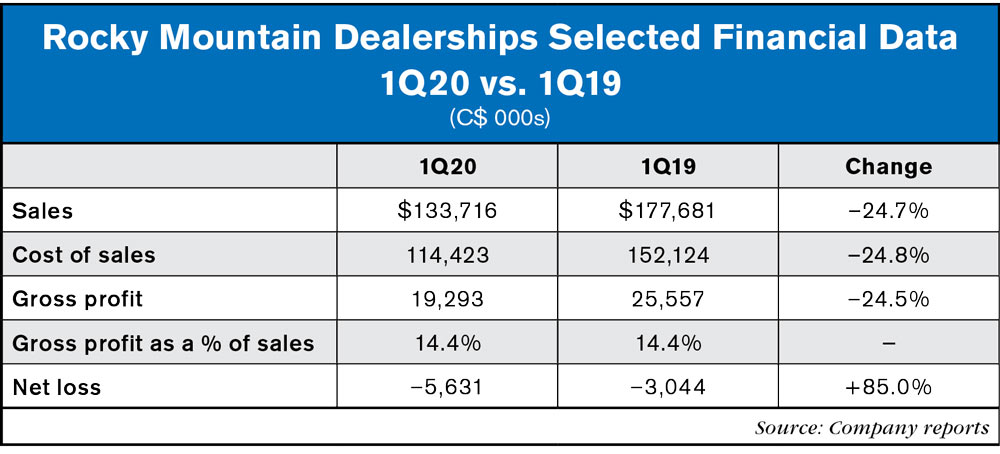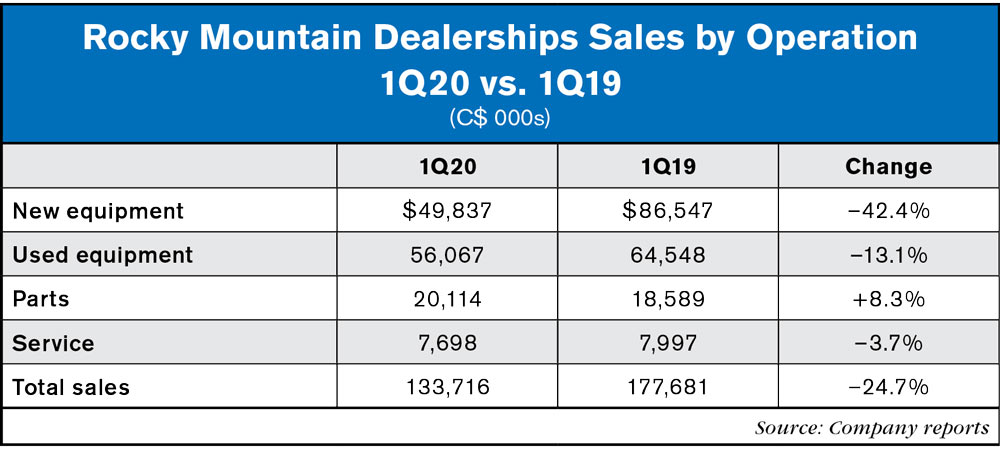Rocky Mountain Dealerships, Case IH’s largest Canadian dealer group, has reported its earnings for the first quarter of 2020. The dealer network reported total sales of $134 million dollars in the first quarter of 2020, down $44 million compared to $178 million reported in the first quarter of 2019, a decline of 25%. The company said this was partially driven by $11.2 million in undelivered equipment sales created by the COVID-19 pandemic, coupled with negative farmer sentiment.
Gross profit was $19.3 million, down 24.5% from $25.6 million reported in the first quarter of 2019. Gross margin percentage for the quarter was 14.4%, in line with the same period in 2019. This was impacted by both negative pricing pressure and decreased OEM incentives on equipment sales but was offset by stability in the Rocky Mountain’s product support offerings.
Used equipment sales for the quarter were $56 million, down by about $9 million, or 13.1%, from $65 million in the same quarter last year. Service sales also saw a decline in the quarter, falling from $7.9 million in the first quarter of 2019 by nearly $300,000, or 3.7%, to $7.7 million. Parts was the only segment that saw an increase in sales for the quarter, up $1.5 million, or 8.3%, to around $20 million, compared to around $18 million in the first quarter of 2019.
Summary of 1Q20
There are four key themes that define the first quarter of 2020 for RME and the Canadian Prairie agriculture industry:
- China’s canola trade embargo
- The protester driven rail blockades
- COVID-19
- A late start to seeding activity
China announced the suspension of canola imports from one of Canada’s largest exporters on March 1, 2019, and followed it up by suspending imports from an additional large Canadian exporter later in March. These moves shocked the canola industry and led to dramatic reductions in farm equipment purchases, beginning in the second quarter of 2019. That trade embargo has continued through the first quarter of 2020.
Beginning in early February and ending in mid-March, protester organized rail blockades interfered with our customers' ability to get their products to market. These blockades reduced our customers cash flows, in turn reducing their willingness to purchase equipment. Though the impacts during the rail blockades affected the quarter, they are not expected to do so on an annualized basis.
The COVID-19 pandemic has had severe consequence for the Canadian and global economies. Despite being deemed essential, RME can be affected by the pandemic’s knock-on effect in the capital markets and broader economy, as demonstrated with the closing of CNH Industrial's factories at the end of March. Those closures, along with the slowed import process moved $11.2 million of potential first quarter sales into the second quarter. While we continue our operations during the COVID-19 pandemic, changes in the way we do business have been pervasive. Be it from staff rotating, minimal on-site visits and safety protocols which limit access for customers. RME continues to monitor its supply chain and has sufficient equipment and parts to support our customers through the critical seeding season.







